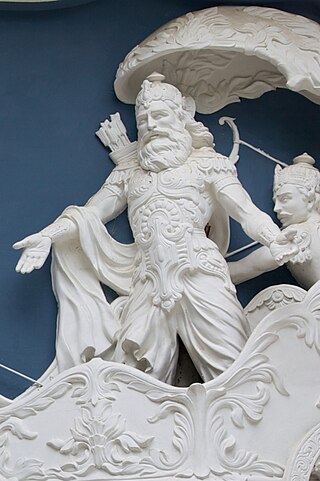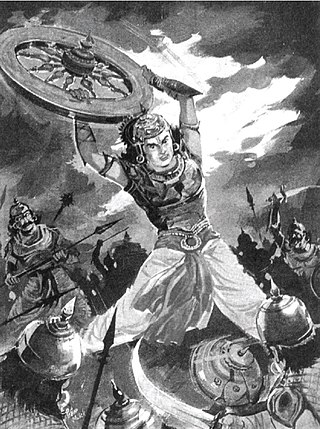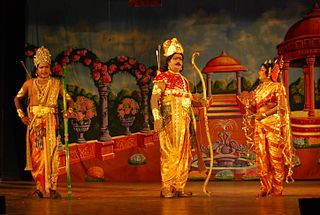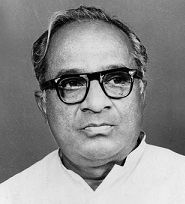Plot
The story starts at Indraprasta where Pandavas are ruling after the partition of Hastinapura. On one occasion Arjuna accidentally breaches privacy of his elder brother Yudhistira and Draupadi when they are together. To repent for this he decides to go on Vanavasa. While in the Manipura kingdom he impresses the princess Chitrangada by hunting a Tiger by Shabdavedhi (non-visual archery). The princess falls for Arjuna and accepts him as her husband.
While bathing in river Arjuna is abducted by Uluchi, the princess of Nagaloka. She admits her feelings for Arjuna and they marry in Gandharva vivaha. Krishna uses his magical powers to bring Arjuna back from Nagaloka. He meets up with Chitrangada and they marry in Gandharva vivaha giving birth to a son, Babruvahana.
Krishna, with the help of Ghatotkacha brings back Arjuna from Manipura and wipes his memory of both the wives - Chitrangada and Uluchi. He says his sister, Subhadra is eligible for marriage and Balarama wishes Duryodhana to be married to her. With the help of Krishna, Arjuna disguises himself as a sanyasi and elopes with Subhadra.
Years pass by and the Pandavas are victorious in Mahabharata war. They organise Ashwamedha yaga to establish sovereignty over the subcontinent. Arjuna spearheads the campaign along with Karna's son, Vrishaketu and conquers kingdoms after kingdom. The scorned queen of one of the defeated kings vows revenge on Arjuna and forces Ganga to curse Arjuna for killing the latter's son Bhishma. Ganga curses Arjuna that he will die at the hands of his own son.
Babruvahana has grown up to become the ruler of Manipura kingdom and surpasses his father Arjuna in archery. Pandavas' Ashwamedha horse enters the kingdom of Manipura. Babruvahana must either accept sovereignty of Pandavas over the region and pay a tribute or defeat Arjuna in battle. Upon learning from his mother that Arjuna is his biological father, Babruvahana goes to Pandavas' camp to offer his submission and to accept Arjuna as his father. Arjuna, who cannot remember Chitrangada insults Babruvahana by calling his mother a woman of loose morals.
Thus the battleground is set for a clash between the forces of Arjuna and Babruvahana. On the first and second days of the battle Babruvahana holds off Arjuna's forces with ease and kills Vrishaketu. On the third day, Arjuna and Babruvahana meet face to face on the battlefield. Chitrangada serves as charioteer of Arjuna whereas Uluchi becomes charioteer of Babruvahana. Babruvahana kills Arjuna and effectively ends their Ashwamedha Yaga. Uluchi reveals herself to be Ganga in disguise who was there to witness her curse reap fruits. Uluchi advises Babruvahana to revive Arjuna using Sanjeevani-mani from Nagaloka.
As Chitrangada is lamenting over Arjuna's death, Takshak decapitates Arjuna's corpse and take his head to Nagaloka. Krishna with the help of his Sudharshan Chakra defeats Takshak's henchmen and brings back the severed head of Arjuna. Using the Sanjeevani-mani which Babruvahana got from Nagaloka, Arjuna is revived. Lord Krishna then revives all the soldiers who died in the battle. Arjuna unites with his wife Chitrangada and accepts Babruvahana as his son.

Arjuna, also known as Partha and Dhananjaya, is a protagonist of the Hindu epic Mahabharata. In the epic he is the third of five Pandava brothers, from the lineage of the Kuru. In the Mahabharata War, Arjuna was a key warrior from the Pandava side and killed many warriors. Before the beginning of the war, his mentor Krishna gave him the supreme knowledge of the Bhagavad Gita to overcome his moral dilemmas.

Singanalluru Puttaswamaiah Muthuraj, better known by his stage name Dr. Rajkumar, was an Indian actor and singer who worked in Kannada cinema. Regarded as one of the greatest and versatile actors in the history of Indian cinema, he is considered a cultural icon and holds a matinée idol status in the Kannada diaspora, among whom he is popularly called as Nata Saarvabhouma, Bangarada Manushya, Vara Nata, Gaana Gandharva, Rasikara Raja, Kannada Kanteerava and Rajanna/Annavru. He was honoured with Padma Bhushan in 1983 and Dadasaheb Phalke Award in 1995. He is the only lead actor to win National Award for Playback singing. His 39 movies have been remade 63 times in 9 languages by 34 actors making him the first actor whose movies were remade more than fifty times and the first actor whose movies were remade in nine languages. He was the first actor in India to enact a role which was based on James Bond in a full-fledged manner. The success of his movie Jedara Bale is credited to have widely inspired a Desi bond genre in other Indian film industries. On the occasion of the "Centenary of Indian Cinema" in April 2013, Forbes included his performance in Bangaarada Manushya on its list of "25 Greatest Acting Performances of Indian Cinema". Upon his death, The New York Times had described him as one of India's most popular movie stars.

Bhishma, also known as Pitamaha, Gangaputra, and Devavrata, is a major character of the epic Mahabharata. He was the supreme commander of the Kaurava forces during the Kurukshetra War of the epic. He was the only character who witnessed the entirety of the events of the Mahabharata, beginning from the reign of his father, King Shantanu of the Kuru kingdom. Bhishma was the stepbrother of Vyasa, the grandfather of both the Pandavas and the Kauravas. He was a prominent statesman of the Kuru Kingdom. He was born as the youngest son of the illustrious King Shantanu and goddess Ganga.

Abhimanyu is a warrior in the Hindu epic Mahabharata. He was the son of Arjuna and Subhadra, the younger sister of Krishna. Abhimanyu is portrayed as a young, strong and talented warrior. He was also one of the few individuals, along with his father, who knew the technique to enter the Chakravyuha, a powerful military formation.
Vikramarjuna Vijaya, also known as Pampa Bharatha is a classic work of the 10th century Jain poet Pampa. It is a Kannada version of the great epic, the Mahabharata of Vyasa. Pampa chose Arjuna, the central figure of the Pandava Clan, as the protagonist of his epic. This work differs from Mahabharata in several aspects, one of them being Arjuna crowned as king and Subhadra as queen after the Kurukshetra war, instead of Yudhishthira and Draupadi, respectively.

In the Hindu epic Mahabharata, Babruvahana is the son of Arjuna, a Pandava prince, and Chitrangada, the princess of Manipura (Mahabharata). Babruvahana was adopted as the heir of Manipura by his maternal grandfather, Chitravahana, and later reigned at the kingdom.

Chitrāngadā, in the Hindu epic Mahabharata, was the warrior princess of Manipura and the only heir of King Chitravahana. She was one of Arjuna's four wives. She had a son named Babhruvahana with him. The story of Chitrāngadā was adapted by Indian writer, Rabindranath Tagore in his play, Chitra.

Ulupi, also known as Uluchi and Ulupika, is a character the Hindu epic Mahabharata. She is a Naga princess, the daughter of the king Kauravya, and is among the four wives of Arjuna. She also finds a mention in the Vishnu Purana and the Bhagavata Purana.

Mahabharat is an Indian Hindi-language epic television series based on the ancient Sanskrit epic Mahabharata. The original airing consisted of a total of 94 episodes and were broadcast from 2 October 1988 to 24 June 1990 on Doordarshan. It was produced by B. R. Chopra and directed by his son, Ravi Chopra. The music was composed by Raj Kamal. The script was written by Pandit Narendra Sharma and the Hindi/Urdu poet Rahi Masoom Raza, based on the epic by Vyasa. Costumes for the series were provided by Maganlal Dresswala. The serial claims to have used the Critical Edition of Bhandarkar Oriental Research Institute as its basic source with Vishnu Sitaram Sukthankar and Shripad Krishna Belwalkar as its primary editor.
The Adi Parva or The Book of the Beginning is the first of eighteen books of the Mahabharata. "Ādi" in Sanskrit means "first".

Mahabharat is a 2013 Indian mythological television series based on the Sanskrit epic Mahabharata. It aired from 16 September 2013 to 16 August 2014 on Star Plus. The series is available digitally on Disney+ Hotstar. Produced by Swastik Productions Pvt. Ltd, it starred Saurabh Raj Jain, Pooja Sharma, Shaheer Sheikh and Aham Sharma.

Shree Krishna Gaarudi is 1958 Indian Kannada language film written and directed by Hunsur Krishnamurthy based on the story by Bellave Narahari Shastri. It narrates the tale of Bheema and Arjuna's pride being crushed by Krishna, after the Kurukshetra War. The bickering and squabbling among the Pandavas for portfolios allegorizes the politics in the then newly formed Mysore state. The movie was remade in Telugu in the same year by well-known director Y. V. Rao starring Jaggayya also titled Shri Krishna Garudi.

Hunsur Krishnamurthy was an Indian playwright, film director, producer, actor, screenwriter and lyricist in Kannada cinema.

Suryaputra Karn is an Indian historical epic television series, which premiered on 29 June 2015 on Sony Entertainment Television (India) and Sony Entertainment Television Asia. The show aired Monday through Friday nights at 8:30 pm. Produced by Siddharth Kumar Tewary of Swastik Pictures, the series covers the life journey of Karna in the Mahabharata. The show starred Gautam Rode, Vishesh Bansal and Basant Bhatt as the lead character at various stages of his life.
Mahabharat Katha is an Indian television series aired on DD National. This is a sequel which contains portions and stories left out of Mahabharat. It was produced by B. R. Chopra and directed by his son Ravi Chopra.
In Hindu texts, the Puru and Yadu Dynasties are the descendants of legendary King Pururavas who was a famous Hindu ruler in the Treta Yuga. Pururavas was the son of Ila and Budha. Some of the dynasties' important members were Yayati, Yadu, King Puru, Turvasu, Druhyu and Anu. According to Hindu mythology, Yayāti was one of the ancestors of Pandavas and the Yaduvamsha.

Babruvahana is a 1964 Indian Telugu-language Hindu mythological film, produced by C. Jaganmohana Rao under the Sri National Art Pictures banner and directed by Samudrala Sr. It stars N. T. Rama Rao, S. Varalakshmi, Chalam, and music composed by Paamarthi. The film is based on the life of Babruvahana, one of the sons of Arjuna.

The Razmnama, British Library Or.12076 is an incomplete illustrated Mughal manuscript of the Razmnama, which is a translation of the Hindu epic Mahabharata written by Naqib Khan, and copied in AH 1007 (1598/99). It contains sections 14–18, the concluding part of the work, with some detached parts. There are 24 full-page Mughal paintings of high quality, all attributed to artists. It is the second of the four surviving Mughal illustrated manuscripts, described in the BL catalogue as "Sub-imperial Mughal".
Manipura, also known as Manalura, is a kingdom mentioned in the Hindu epic Mahabharata. According to the epic, it was located near a sea-shore, the Mahendra Mountains and the Kalinga Kingdom. Arjuna—one of the five Pandava brothers—visited Manipura and married Chitrangada, the princess of the kingdom. They had a son named Babruvahana who later ruled it.













